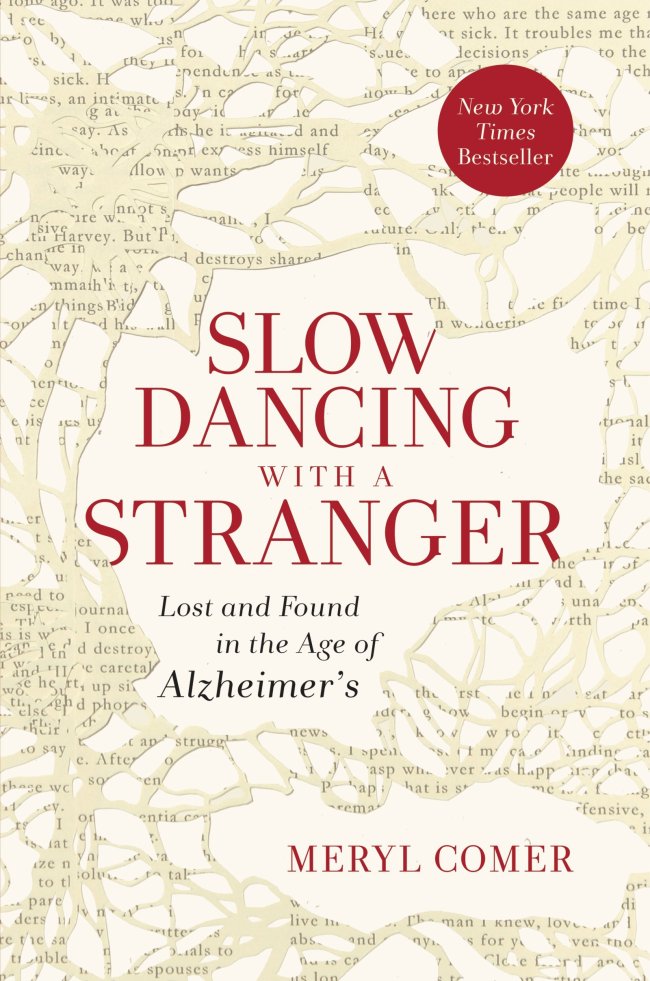Meryl Comer probably couldn’t tell you the most harrowing moment of her journey through Alzheimer’s. Maybe it happened before her husband Harvey’s diagnosis, when he brandished a carving knife at Thanksgiving.
Or maybe it occurred when she watched the brilliant doctor of hematology and oncology at the National Institutes of Health, only in his late 50s, fumble his way through a lecture he once would have delivered with poise and efficiency. Or when he traveled overseas for a conference ― against her wishes ― and got lost in Paris for two days.
“I have spent close to two decades trying to decipher what’s going on in my husband’s head,” Comer writes in her book “Slow Dancing With a Stranger: Lost and Found in the Age of Alzheimer’s.” “His disease is my crossword puzzle.”
 |
| “Slow Dancing With a Stranger: Lost and Found in the Age of Alzheimer’s,” by Meryl Comer. (HarperOne) |
Comer has spent years caring for not one but two Alzheimer’s patients (in a heartbreaking twist of fate, her mother was diagnosed with the disease as well). At 48, Comer gave up her career as a journalist, TV producer and business talk show host to become a full-time caregiver with all the stress, fear, fury, sorrow and exhaustion that entails.
Writing the book, she says, was not cathartic ― but it was necessary. It’s also charitable: 100 percent of the book’s proceeds will go toward Alzheimer’s research.
“I wanted an honest conversation,” says the author, now 70 and the president and CEO of the Geoffrey Beene Foundation Alzheimer’s Initiative and cofounder of Women Against Alzheimer’s. “When you’re in a space where there’s no hope, descriptions go soft around the edges. You get the image of the little old lady going senile, when this is the cruelest of diseases. … As women we were trained to be stoic and swallow our pain and really not talk about it. This is permission to say: ‘This is a cruel disease, and we have to stop it.’ My goal as an advocate is to change the conversation. It’s unacceptable for our future. We can’t leave the next generation with the burden of our care.”
Comer can rattle off disturbing facts and figures about the disease ― Florida has more Alzheimer’s patients than any state but California; the U.S. spends $215 billion on care and less than 1 percent on research ― but her memoir is deeply personal and all the more powerful for it.
“I think there’s a mythology that Alzheimer’s is a passive fading away of an individual,” says George Vradenburg, chairman and founding board member of UsAgainstAlzheimer’s, an organization that presses for greater urgency from the government, industry and scientific communities in the search for a cure. “Nancy Reagan gave us the romantic vision of the long goodbye. Meryl’s book highlights the harsh reality.
It highlights in a personal way the real story, the impact of the disease not just on the victim but on the entire family. It highlights the need to regard the caregiver as the second-hand victim of the disease.”
As a long-term caregiver, Comer understands the challenges (she writes that she neglected her own health for decades; there just wasn’t time for routine checkups). She created an online brain study for caregivers in order to measure and examine their condition (you can sign up to participate at merylcomer.com/e-lab).
“We think we’re OK, but we’re operating at less than 50 percent cognitive efficiency,” she says, adding that though she’s in her office now, she has just come off her own 12-hour shift caring for her husband and mother. “I tell women: Protect yourselves. Women are more at risk because we outlive men statistically. Two-thirds of caregivers are women. Women are having to leave jobs we fought hard to get. We’ve got to plan ahead.”
Robert Levine, professor and chair at the Department of Emergency Medicine and Critical Care at the Herbert Wertheim College of Medicine at Florida International University, agrees that finding new ways to support caregivers is vital.
“People forget the people around the patient,” he says. “There’s very little support for these people who have their lives altered irrevocably.”
But while support groups can be helpful to caregivers ― if they can find time to participate ― Comer’s advocacy lies in a different direction. She wants to remind everyone of the necessity of financial planning for catastrophic illnesses and, most importantly, demand more research into Alzheimer’s prevention.
“There’s no fight in Congress for more money,” she says. “There’s not a war on Alzheimer’s the way there was a war on cancer or on HIV. How do you unlock dollars to make that happen? … We want the brain span to match the life span.
“I don’t, quite frankly, believe in cures. I believe in managing diseases. If we could slow progression and create a disease-modifying drug and we could slow it for five years or so, we could buy time and save health care costs. This is a time when Baby Boomers are turning 65. You can see the train wreck coming.”
By Connie Ogle
(Miami Herald)
(Tribune Content Agency)



